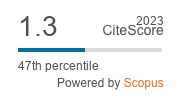Innovation Levels in the Economies of Central and Eastern Europe
DOI:
https://doi.org/10.2478/cer-2014-0025Keywords:
innovation, competitiveness, Central and Eastern Europe, European UnionAbstract
When the countries of Central and Eastern Europe entered the European Union, they were given the opportunity to become transformed into knowledgebased societies, with modern, innovation-oriented economies which build their strength and competitiveness on the development of native technical solutions and concepts. To achieve this, however, requires a lot of effort and radical and profound changes in comparison with the previous situation. New priorities and strategic objectives and methods of their implementation (including innovation strategies) must be developed, financial and in-kind resources reallocated, and social and technical infrastructure must be expanded and modernized. These are difficult challenges, but their effective implementation is essential so that the CEECs can avoid marginalization and become equal partners within the EU. The statistical data presented in this paper indicates that the innovative position of the CEECs is still unfavourable and relatively weak, with the exception of Slovenia and Estonia. Poland is in a particularly difficult situation, with many signs of stagnation with respect to innovation, keeping it at a low level (next to Bulgaria and Romania).
Downloads
References
Baczko T. (red.) (2013), Raport o Innowacyjności Gospodarki Polski 2012, PAN, Warsaw
Google Scholar
European Innovation Scoreboard (2009) Comparative analysis of innovation performance, European Communities (2009), Luxembourg
Google Scholar
Gołębiowska-Tadaj D. (2013), Nowe modele współpracy między nauką, edukacją a biznesem. Rola przedsiębiorczości w integracji, ʻTrójkąta wiedzyʼ, a paper at the Ninth Congress of Polish Economists, PTE, Warsaw, 28-29 November 2013
Google Scholar
Innovation Union Scoreboard (2013); Enterprise and Industry European Commission, European Union, Brussels
Google Scholar
Kleer J. (2013), Rozwój imitacyjny: zalety i wady, a paper at the Ninth Congress of Polish Economists, PTE, Warsaw, 28-29 November 2013
Google Scholar
Krajewski S. (2009), Prywatyzacja, restrukturyzacja, konkurencyjność polskich przedsiębiorstw, PTE, Warsaw
Google Scholar
Krajewski S. (2013), Innowacyjność polskiej gospodarki. Mity i fakty, a paper at the Ninth Congress of Polish Economists, PTE, Warsaw, 28-29 November 2013
Google Scholar
Marciniak S. (2013), Szkodliwość niektórych ocen polskiej innowacyjności, a paper at the Ninth Congress of Polish Economists, PTE, Warsaw, 28-29 November 2013
Google Scholar
Nauka i technika w 2012 r. (2013), GUS, Warsaw
Google Scholar
Statistical Yearbook of the Republic of Poland, (2013), GUS, Warsaw 2013
Google Scholar
Sarul J. (2013), Polska polityka gospodarcza po akcesji do Unii Europejskiej – wspieranie czy wypieranie innowacyjności, a paper at the Ninth Congress of Polish Economists, PTE Warsaw, 28-29 November 2013
Google Scholar
Weresa M. (2013a), Polska – raport o konkurencyjności 2013, SGH, Warsaw
Google Scholar
Weresa M. (2013b), Silne i słabe strony systemów innowacji krajów członkowskich UE z Europy Środkowej i Wschodniej, a paper for the conference ‘Forms and methods of economic integration.’ The Joint Commission of Economists of the Polish Academy of Sciences and RAN, Warsaw, 25-27 June 2013
Google Scholar
Wróblewski A.K. (2012), Pozycja nauki polskiej w międzynarodowych rankingach, Studia BAS, No. 3(35)
Google Scholar
Downloads
Published
How to Cite
Issue
Section
License

This work is licensed under a Creative Commons Attribution-NonCommercial-NoDerivatives 4.0 International License.











